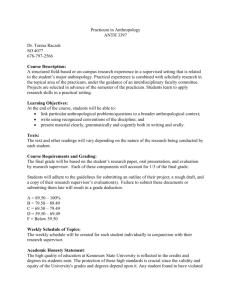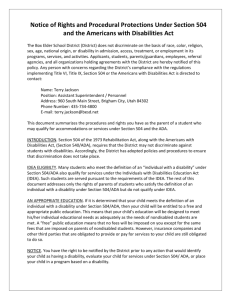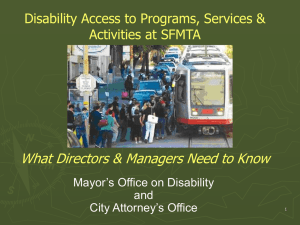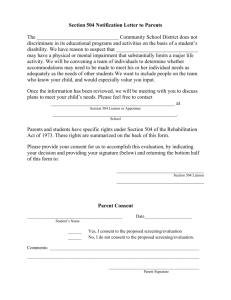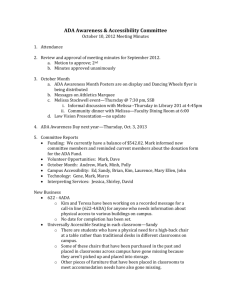Section 504-ADA Overview - Atkinson County Schools
advertisement
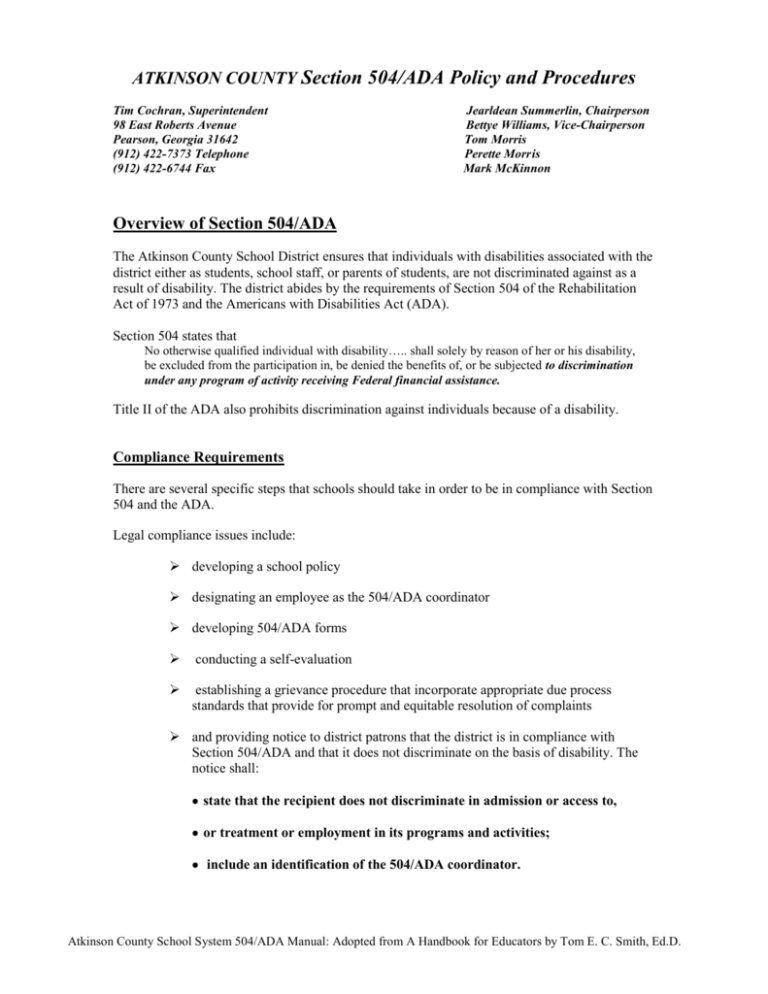
ATKINSON COUNTY Section 504/ADA Policy and Procedures Tim Cochran, Superintendent 98 East Roberts Avenue Pearson, Georgia 31642 (912) 422-7373 Telephone (912) 422-6744 Fax Jearldean Summerlin, Chairperson Bettye Williams, Vice-Chairperson Tom Morris Perette Morris Mark McKinnon Overview of Section 504/ADA The Atkinson County School District ensures that individuals with disabilities associated with the district either as students, school staff, or parents of students, are not discriminated against as a result of disability. The district abides by the requirements of Section 504 of the Rehabilitation Act of 1973 and the Americans with Disabilities Act (ADA). Section 504 states that No otherwise qualified individual with disability….. shall solely by reason of her or his disability, be excluded from the participation in, be denied the benefits of, or be subjected to discrimination under any program of activity receiving Federal financial assistance. Title II of the ADA also prohibits discrimination against individuals because of a disability. Compliance Requirements There are several specific steps that schools should take in order to be in compliance with Section 504 and the ADA. Legal compliance issues include: developing a school policy designating an employee as the 504/ADA coordinator developing 504/ADA forms conducting a self-evaluation establishing a grievance procedure that incorporate appropriate due process standards that provide for prompt and equitable resolution of complaints and providing notice to district patrons that the district is in compliance with Section 504/ADA and that it does not discriminate on the basis of disability. The notice shall: state that the recipient does not discriminate in admission or access to, or treatment or employment in its programs and activities; include an identification of the 504/ADA coordinator. Atkinson County School System 504/ADA Manual: Adopted from A Handbook for Educators by Tom E. C. Smith, Ed.D. Methods for initial and continuing notice may include: posting of notices publication in newspapers & magazines placement in recipient’s publications, & distribution of memoranda or other written communications Schools that publish materials for the general public must include a copy of their notice in these materials (34C.F.R. Part 104.7). In compliance with Section 504 and the ADA, the Atkinson County School District agrees to provide students covered under these acts with a free appropriate public education (FAPE). Under 504 and the ADA, a person is considered to have a disability if that person (29 U.S.C. Sec.706(8)): (1) has a physical or mental impairment which substantially limits one or more of such person’s major life activities, (2) has a record of such an impairment, or (3) is regarded as having such an impairment The Act defines a physical or mental impairment as: (A) any physiological disorder or condition, cosmetic disfigurement, or anatomical loss affecting one or more of the following body systems: neurological; musculoskeletal; special sense organs; respiratory; including speech organs; cardiovascular; reproductive; digestive; genito-urinary; hemic and lymphatic; skin; and endocrine; or (B) any mental or psychological disorder, such as mental retardation, organic brain syndrome, emotional or mental illness, and specific learning disabilities. Students with disabilities, who are protected under Section 504 and the ADA, but not eligible for IDEA services, must be afforded a free appropriate public education (FAPE). FAPE is defined as: The process that the Atkinson County School District uses to ensure FAPE includes referral, evaluation, programming planning, placement, and re-evaluation. 2 Referral Referral of children for Section 504 and the ADA can be made by anyone. Generally, teachers and parents make most of the referrals. Students should be referred for 504/ADA services if it is believed that they meet the definition of disability noted above. School staff that want to make a referral of a student for 504/ADA services should complete a 504/ADA referral form and submit it to the district 504/ADA coordinator (Part 1: Review Request). A child who has been referred for consideration for 504/ADA services does not automatically qualify or is found eligible. Referral is simply a first step in the process. Upon referral, the system 504/ADA coordinator will form a referral committee. This will be comprised of a minimum of three school staff who are knowledgeable about the child and about Section 504/ADA services. The committee will meet and determine if there is reason to believe that the child is eligible. If the decision of the committee is that there is little or no likelihood that the child is eligible, parents are notified of this decision. The process stops at this point unless the parent chooses to pursue an appeal through due process. If the committee decides that the child is likely eligible, it decides what evaluations are needed to make the eligibility decision. Regardless of the decision of the committee, a referral committee decision form (Part 2: Pre-Meeting Details) is completed and submitted to the district 504/ADA coordinator and the parents are notified. Evaluation If the referral committee deems it likely that the child is eligible for 504/ADA services then the school must conduct an evaluation to determine if the student is eligible for 504/ADA services, and what services would be required to ensure a free appropriate public education. The evaluation is completed by appropriate school staff. Administering additional tests may or may not be necessary, depending on the information needed by the assessment committee (a minimum of three individuals knowledgeable about the child and 504/ADA services). Observations, anecdotal information, and other informal evaluation information may be used by the assessment committee. Eligibility Determinations and Program Development School personnel should utilize all available assessment information to determine the needs of students who are eligible under Section 504 and the ADA. The 504/ADA Eligibility/Plan Committee should make the eligibility decision, which is a group of at least three individuals knowledgeable about 504 and the ADA. The committee must decide if there is a substantial limitation to a major life activity. The eligibility determination form (Part 3a: 504 Eligibility Meeting), should be completed by the committee, including a decision concerning eligibility. If the child is determined eligible, a written plan is developed using the 504/ADA Accommodation Plan Form (Part 3a/3b: 504 Eligibility Meeting/Eligibility Statement) included in this policy. All teachers involved in carrying out the plan should be involved in the plan 3 development. If this is not possible, the chair of the committee should meet with teachers not present to go over the contents of the plan. At the end of each school year, the student’s accommodation plan will be reviewed by the Eligibility/Plan Committee to determine the effectiveness of the program. This should be completed during April or May. The committee will develop a temporary accommodation plan for the beginning of the next school year. Teachers that the student will have during the next year should be involved in the review or at least informed about the results of such a review. A flow chart, depicting 504/ADA processing for services, is included in this document. Due Process Requirements Parents of Children served under 504/ADA will be provided with notice an opportunity for parents of guardian of the student to examine relevant records an impartial hearing, and a review procedure Parents of children referred for 504/ADA services or receive such services have the following rights: right to be informed by the district of specific due process rights right for the child to have access to equal academic and non-academic school activities right for the child to have an appropriate education in the least restrictive setting, which includes accommodations, modifications, and related services right to notice regarding referral, evaluation, and placement right for the child to have a fair evaluation conducted by a knowledgeable person(s) right to an administrative appeals process right to examine and obtain copies of all school records A copy of these rights will be provided for parents using the Parent’s Rights Form, found at the end of this policy. Parents have a right to initiate the district’s grievance policy. A copy of this policy is included in the Section 504/ADA School Policy. Questions about 504/ADA should be directed to either your site coordinator. The site coordinator can be reached at 912-422-3869 (Pearson Elementary School). 912-534 -5302 (Willacoochee Elementary School). 912-422-3267 (Atkinson County Middle School). 912-422-3267 (Atkinson County High School). 4 Section 504/ADA School Policy and Procedures Atkinson County School District Section 504 of the Rehabilitation Act and the Americans with Disabilities Act (ADA) are both civil rights statutes for persons with disabilities. Section 504 states that: the ADA is similar to 504 in that it prohibits discrimination against otherwise qualified individuals with disabilities compliance with the requirements of Section 504 and ADA will be coordinated by the Special Education Director, who has been designated by the Atkinson County School Board as the 504/ADA Coordinator. The coordinator can be reached at 912-44-7373. The coordinator will: coordinate the implementation of all aspects of the 504 and ADA with each building principal serve as a resource person to district staff concerning interpretation of 504/ADA requirements keep up to date with any changes in 504 or the ADA that impact the Atkinson County School District collect and maintain materials and resources related to 504 and the ADA for staff use coordinate staff in service training related to 504 and the ADA coordinate the review and updating of the 504/ADA policy coordinate delivery of 504/ADA services to eligible students at the building level in cooperation with building administrator. Receive parent/guardian requests for impartial hearings or complaint investigations Coordinate the district’s “Child Find” for 504/ADA services Keep the superintendent informed concerning issues related to 504/ADA Collect and process information/records related to 504/ADA services Maintain a district-wide listing of students served under 504/ADA The Atkinson County School District will ensure that students served under 504 and the ADA receive a free and appropriate public education, as defined by the acts. This means that general and special education and related aids and services will be provided to these students to ensure that they benefit educationally as well as non-disabled students benefit. In order to ensure this occurs, school staff will adhere to the following flow chart related to various actions for students under 504 and the ADA: 5 Flow Chart for 504/ADA Services Referral for 504/ADA services Referral Committee Determines likelihood of eligibility Not Likely eligible Likelihood of eligibility End of Process (Parents notified of decision and their due process rights) Evaluation to determine eligibility Not Eligible End of Process (Parents notified of decision and their due process rights) Eligible Development of Accommodation Plan Implementation of Accommodation Plan Annual Review Three Year Re-evaluation 6 Procedures for Student Referral 1. Student’s principal (or site level 504/ADA coordinator) is notified that the student is suspected of being eligible for 504/ADA services by one of the following individuals: Student’s parents/guardians School personnel Community medical professional personnel Other interested person 2. Notification to the principal (or site level coordinator) shall be in writing using the districts 504/ADA referral form. 3. After student is referred, principal (or site level coordinator) will: Notify parents/guardians of 504/ADA referral. Convene meeting of 504/ADA committee (minimum of 3 individuals knowledgeable about 504/ADA and the child). Decision is made about student’s likelihood. If committee decides student is not likely eligible, notification to parents/guardians with explanation of due process rights is given. If decision is that the student is likely eligible, parents/guardians notified and evaluation completed to determine eligibility. Procedures for 504/ADA Evaluation All evaluation instruments will: have been validated for the specific purpose for which they are used and are administered by trained personnel in conformance with the instructions provided by their producer; include materials tailored to assess specific areas of educational need and not merely materials that are designed to provide a single general intelligence quotient; and be selected and administered so as to best ensure that, when a test is administered to a student with impaired sensory, manual or speaking skills, the test results accurately reflect the students aptitude or achievement level or whatever other factor the test purports to measure, rather than reflecting the student’s impaired sensory, manual, or speaking skills (except where those skills are the factors that the test purports to measure). After evaluation has been collected, the committee will: draw upon information from a variety of sources in order to make eligibility decision and decisions related to accommodations; establish procedures to ensure that information obtained from all such sources are documented and carefully considered; 7 ensure that decisions about the child are made by a group of persons, including persons knowledgeable about the child, the evaluation data, and placement options. determine eligibility using eligibility determination process . If determined not eligible, parents/guardians are notified and a copy of their due process rights are provided. If the student is found to be eligible, an accommodation plan is developed using the 504/ADA Accommodation Plan form. Student Accommodation Plans 1. Individual Accommodation Plans are developed for each student determined eligible for 504/ADA services. These plans are developed by the 504/ADA committee (at least three individuals) and should include school staff involved in making the accommodations in the classroom. 2. Parents are provided a copy of the accommodation plan. 3. Accommodation/Modification plan should be reviewed during an annual review process to determine its effectiveness and whether or not it should be continued or modified for next school year. 4. At least every three years, students must be re-evaluated to determine on-going eligibility for 504/ADA services. Non-Academic Services and Activities Section 504 and the ADA require that students covered have equal opportunities to participate in extracurricular and other non-academic services and activities. Services such as counseling, transportation, physical education, recreational athletics, clubs, special interest groups, and other activities sponsored by the school must be accessible for students with disabilities. Discipline and students served under 504/ADA Students served under Section 504 and the ADA are treated similar to students served under IDEA with regard to discipline. First, these students can definitely be disciplined. Rules and standards can be applied to these students just as they are applied to non - disabled students. The important thing to consider is that these students have an equal opportunity to be successful with classroom rules and behavioral regulations. In order to ensure this with some students, a behavior intervention plan may be necessary to have in place. Before taking certain actions with students served under Section 504 and the ADA, school personnel must make and follow specific steps. The following summarizes some of these considerations when dealing with students protected by these two laws: Disciplinary procedures for students under 504 are similar to those under IDEA. 8 Under both laws, all students are entitled to oral or written notice of charges and the opportunity to tell their side before suspension of 10 days or less, and a formal hearing before a suspension of more than 10 days. Expulsion or suspensions of 10 or more days are considered a change of placement and require procedural requirements of IDEA or 504. A manifest determination must be made before suspending or expelling a student under IDEA or 504/ADA for more than 10 days. Suspensions of less than 10 days are permissible but cannot set a pattern (school officials should review appropriateness of placement if cumulative times are more than 10 days). If a manifest determination shows no relationship between the behavior and disability, then the student may be disciplined as any other student. If a manifest determination shows that there is a relationship between the behavior and disability, then the student may NOT be expelled or suspended; the school should consider the appropriateness of the current program and consider appropriate changes. IDEA students who are expelled must continue to receive a FAPE; 504 students do not have to be provided with FAPE during expulsion or suspension for behavior not related to the disability. Students currently engaged in drug or alcohol abuse are not protected under Section 504. Student Grievances – Section 504 and the Americans with Disabilities Act Section 504 of the Rehabilitation Act of 1973 and the Americans with Disabilities Act prohibit discrimination against students with disability. No discrimination against any student with a disability will knowingly be permitted in any of the programs or activities of the school district. To ensure the district’s compliance with Section 504 and the ADA, the following grievance procedures have been adopted. 1. If a student claims that he or she has been subjected to discrimination on the basis of a disability, in violation of Section 504 or the ADA, or if the district has reason to believe that a student has a disability requiring special instruction or related services (and the student is not eligible for services under IDEA), a team of individuals who are knowledgeable about the student’s educational needs shall be convened to review and consider all pertinent information related to the suspected disability. The team should be a multidisciplinary team including, where possible, the student’s teachers, parents, principal or designee, and someone qualified to interpret test scores. Information such as grades, classroom documentation, comprehensive assessment data, and other relevant information should be examined. This meeting will be convened within ten calendar days after the district receives a written statement describing the specific discriminatory conduct or the date when the district becomes aware of the student’s disability requiring special instruction or related services. 9 2. The Team shall determine (1) whether the student is disabled under Section 504 the ADA, (2) whether the student, because of the disability, requires special instruction or related services. If the student meets both criteria, the team must determine what accommodations are required to allow the student an equal opportunity to participate in school and school-related activities. If the parents disagree with the district’s conclusion and recommendation, the parents shall be informed of their right to ask for an impartial hearing to decide the matter. 3. Overview: Any student or parent or guardian (“grievant”) may request an impartial hearing due to the school system’s actions or inactions regarding the child’s identification, evaluation, or educational placement under Section 504. Requests for an impartial hearing must be in writing to the school system’s Section 504 Coordinator; however, a grievant’s failure to request a hearing in writing does not alleviate the school system’s obligation to provide an impartial hearing if the grievant orally requests an impartial hearing through the school system’s Section 504 Coordinator. The school system’s Section 504 coordinator will assist the grievant in completing the written Request for Hearing. Hearing requests shall be made in writing to the superintendent within ten calendar days of the district’s conclusion and recommendations regarding accommodations. The request shall give specific reasons describing the discriminatory actions by the district and why the district’s accommodations are not appropriate. The hearing requests shall include a list of accommodations requested by the parents and an explanation of why such accommodations are appropriate, along with copies of any documents upon which the parents rely for support. 4. Hearing Request: The Request for the Hearing must include the following: a. The name of the student. b. The address of the residence of the student. c. The name of the school the student is attending. d. The decision that is the subject of the hearing. e. The requested reasons for review. f. The proposed remedy sought by the grievant. g. The name and contact information of the grievant. Hearing Requests shall be made in writing to the Section 504 Coordinator/Superintendent within ten calendar days of the district’s conclusion and recommendations regarding accommodations. The request shall give specific reasons describing the discriminatory actions by the district and why the district’s accommodations are not appropriate. Within 10 business days from receiving the grievant’s Request for Hearing, the Section 504 Coordinator will acknowledge the Request for Hearing in writing and schedule a time and place for a hearing. If the Written Request for Hearing does not contain the necessary information noted above, the Section 504 Coordinator will inform the grievant of the specific information needed to complete the request. All timelines and processes will be stayed until the Request for Hearing contains the necessary information noted above. 5. Mediation: The school system will offer mediation to resolve the issues detailed by the grievant in his or her Request for Hearing. Mediation is voluntary and both the grievant and school system must agree to participate. The grievant may terminate the mediation at any time. If the mediation is terminated without an agreement, the school system will follow the procedures for conducting an impartial hearing without an additional Request for Hearing. 6. Appointment of a Hearing Officer: Within fifteen (15) days of the date of receipt of a clear Request for a Due Process Hearing, the Superintendent or his/her designee will 10 appoint an impartial Hearing Officer to preside over the hearing and issue a decision. The selected impartial hearing officer will: a. be hired by the District as an independent contractor at no expense to the parent b. be qualified to review school district decisions relating to Section 504: a school official from another school district, a retired school official from another district, or an attorney. c. be impartial and unbiased; and d. not a current employee of the District or related to any member of the School Board. The District’s choice of an impartial Hearing Officer is final and may not be made an issue at the due process hearing, since such an issue would not relate to the identification, evaluation, or placement of a disabled child under Section 504. If a parent disputes the impartiality of the appointed Hearing Officer, he or she may raise such issue in a review of the Hearing Officer’s opinion by a court of competent jurisdictions or, in a complaint to the appropriate Office for civil Rights regional office. 7. Hearing Procedures: The hearing officer shall conduct the hearing so as to give the parents an opportunity to present evidence supporting their claim that their child has been subjected to discriminatory treatment in violation of Section 504 and the ADA. The district shall be given the opportunity to present evidence supporting its position with respect to the student. District personnel will make a tape recording of the hearing and a copy of the tape recording will be provided to the parents. a. The Section 504 Coordinator will obtain an impartial review official knowledgeable of Section 504/ADA who will conduct a hearing within 45 calendar days from the receipt of the grievant’s Request for Hearing unless agree to otherwise by the grievant or a continuance is granted by the impartial review official. b. Upon a showing of good cause by the grievant or school system, the impartial review official, at his or her discretion, may grant a continuance and set a new hearing date. The request for a continuance must be in writing and copied to the other party. c. The grievant will have an opportunity to examine the child’s educational records prior to the hearing. d. The grievant will have the opportunity to be represented by legal counsel at his or her own expense at the hearing and participate, speak, examine witnesses, and present information at the hearing. If the grievant is to be represented by legal counsel at the hearing, he or she must inform the Section 504 Coordinator of that fact in writing at least 10 calendar days prior to the hearing. Failure to notify the Section 504 Coordinator in writing of representation by legal counsel shall constitute good cause for continuance of the hearing. e. The grievant will have the burden of proving any claims he or she may assert. When warranted by circumstances or law, the impartial hearing officer may require the recipient to defend its position/decision regarding the claims (i.e. A recipient shall place a disabled student in the regular educational environment operated by the recipient unless it is demonstrated by the recipient that the education of the person in the regular environment with the use of supplementary aids and services cannot be achieved satisfactorily. 34 C.F.R.ξ104.34). One or more representatives of the school system, who may be an attorney, will attend the 11 hearing to present the evidence and witnesses, respond to the grievant testimony and answer questions posed by the review official. f. The hearing officer shall make a decision within ten calendar days after the conclusion of the hearing. The decision shall be given in writing to the district’s 504/ADA coordinator and parents, including the right to examine records relevant to their child, and the right to and the right to an impartial hearing with representation by counsel. These procedural safeguards should be provided to parents any time the district takes action with regard to identification, evaluation, or educational placement of a student with a disability. g. The impartial hearing will be conducted in an informal manner with the hearing officer directing the meeting and presentation of evidence. The hearing officer shall have the authority to issue pre-hearing instructions, which may include requiring the parties to exchange document and names of witnesses to be present. h. The impartial review official shall determine the weight to be given any evidence based on its reliability and probative value. i. The hearing shall be closed to the public. j. The issues of the hearing will be limited to those raised in the written or oral request for the hearing. k. Witnesses will be questioned directly by the party who calls them. Crossexamination of witnessed will be allowed. The impartial review official, at his or her discretion, may allow further examination of witnessed or ask questions of the witnesses. l. Testimony shall be recorded by court reporting or audio recording at the expense of the recipient. All documentation related to the hearing shall be retained by the recipient. m. Unless otherwise required by law, the impartial review official shall uphold the action of school system unless the grievant can prove that a preponderance of the evidence supports his or her claim. n. Failure of the grievant to appear at a scheduled hearing unless prior notification of absence was provided and approved by the impartial review official or just cause is shown shall constitute a waiver of the right to a personal appearance before the impartial review official. 8. Decision: The impartial review official shall issue a written determination within 20 calendar days of the date the hearing concluded. The determination of the impartial review official shall not include any monetary damages or the award of any attorney’s fees. 9. Review: If not satisfied with the decision of the impartial review official, any party may pursue any right of review, appeal, cause of action or claim available to them under the law or existing state or federal rules or regulations. 12




